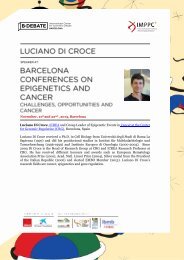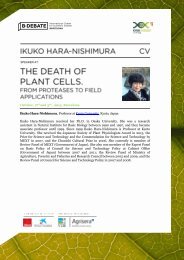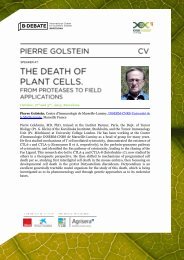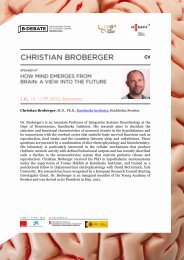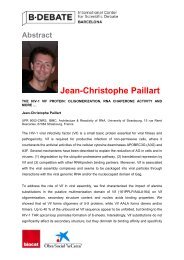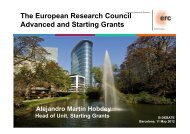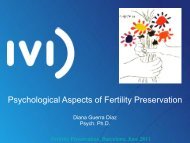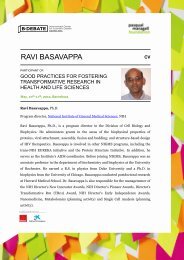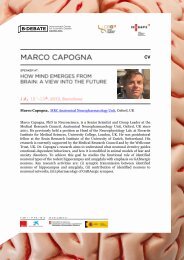MIGRANT HEALTH AND IMPORTED DISEASES ... - B·Debate
MIGRANT HEALTH AND IMPORTED DISEASES ... - B·Debate
MIGRANT HEALTH AND IMPORTED DISEASES ... - B·Debate
Create successful ePaper yourself
Turn your PDF publications into a flip-book with our unique Google optimized e-Paper software.
Migrant<br />
Health and<br />
Imported<br />
Diseases:<br />
meeting<br />
research<br />
challenges<br />
March, 9 th -10 th , 2011<br />
Barcelona<br />
Organizers:
<strong>MIGRANT</strong><br />
<strong>HEALTH</strong> <strong>AND</strong><br />
<strong>IMPORTED</strong><br />
<strong>DISEASES</strong>:<br />
MEETING<br />
RESEARCH<br />
CHALLENGES<br />
March, 9 th -10 th , 2011<br />
CosmoCaixa. Barcelona<br />
Introduction<br />
“Migrant Health and Imported Diseases: meeting research challenges” is devoted to analyzing<br />
challenges related to undertaking research on migrant health and imported diseases will be held in<br />
CosmoCaixa, Barcelona, on March 9 th and 10 th . The meeting will gather specialists in international and<br />
public health, clinical research, social sciences, entomology, biosecurity and climate, among other<br />
fields, in order to explore priority areas and to improve research on migrant health and imported<br />
diseases.<br />
The meeting will be organized around debate sessions, to foster discussion among speakers and the<br />
audience. Three topics will be discussed: current challenges in clinical research on migrants’ health;<br />
researching the social determinants of migrants’ health and improving access to healthcare; and, the<br />
relevance of imported diseases and the possibility of their introduction into Europe.<br />
Although participation in the meeting will be by invitation only, the open symposium entitled,<br />
“Challenges posed by the introduction of imported diseases in Catalonia” will be held during the<br />
afternoon of Thursday, 10 th . Topics, such as the challenges of emerging infectious diseases, possible<br />
scenarios linked to climate change and the presence of vectors in Catalonia, lessons learnt from<br />
recent experiences and local capacity to react to emerging or re-emerging diseases, will be discussed.<br />
The meeting is organized by the International Centre for Scientific Debate (ISCD), an initiative of<br />
Biocat supported by “la Caixa” Foundation, the Barcelona Centre for International Health Research<br />
(CRESIB-Hospital Clinic, University of Barcelona) and the Institute for Global Health of Barcelona<br />
(ISGlobal).
Program<br />
Wednesday, March 9 Th<br />
9:30 Opening<br />
10:00 Lecture: European research on the health of migrants and their access to appropriate<br />
health care.<br />
Prof. David Ingleby. Professor. European Research Centre on Migration and Ethnic Relations<br />
(ERCOMER). Utrecht University. The Netherlands.<br />
11:30 Session 1: Current challenges in clinical research on migrants health.<br />
Dr. Zeno Bissofi. (Chair). Centre for Tropical Diseases, Sacro Cuore Hospital of Negrar.<br />
Verona, Italy.<br />
Prof. Ildefonso Hernández. Head of the Department of Preventive Medicine and Public<br />
Health. Faculty of Medicine. Miguel Hernandez University. Alicante, Spain<br />
Dr. Jose Muñoz. MD, PhD, Researcher. Tropical Medicine Division, International Health<br />
Centre, Hospital Clínic de Barcelona and CRESIB. Barcelona, Spain.<br />
Dr. Faustino Torrico. MD, PhD, Professor. Faculty of Medicine of the Universidad Mayor de<br />
San Simon Cochabamba, Bolivia.<br />
Dr. Antoni Plasència. Director General of Public Health. Ministry of Health. Generalitat de<br />
Catalunya. Barcelona, Spain.<br />
14:30 Session 2: Researching the social determinants of migrants’ health and improving<br />
access to healthcare.<br />
Prof. David Ingleby (Chair). Professor. European Research Centre on Migration and Ethnic<br />
Relations (ERCOMER). Utrecht University. The Netherlands.<br />
Dr. Marie Karen Kristiansen. PhD. Danish Research Centre for Migration, Ethnicity, and<br />
Health (MESU). Department of Public Health. Copenhagen, Denmark<br />
Dr. Ursula Karl-Trummer Head of Centre for Health and Migration, Danube University<br />
Krems. Krems, Austria.<br />
Dr. Heide Castañeda. PhD, MPH. Department of Anthropology, University of South Florida.<br />
Florida, USA.<br />
Prof. Josep M Comelles. M.D. Ph.D, Professor. Department of Anthropology, Philosophy and<br />
Social Work. Universitat Rovira i Virgili. Tarragona, Spain.<br />
Thursday, March 10 Th<br />
9:30 Lecture. A mollusc on the leg of a beetle: human activities and the global dispersal of<br />
vectors and vector-borne pathogens<br />
Professor Paul Reiter. Head. Insects and Infectious diseases Department. Institute Pasteur.<br />
París, France.<br />
11:00 Session 3: Relevance of imported diseases and the possibility of their introduction into<br />
Europe<br />
Prof. Ned Hayes (Chair) Research Professor. CRESIB, Hospital Clínic-University of<br />
Barcelona. Barcelona, Spain<br />
Dr. Carlos Aranda. Co-Director. Regional Council of Baix Llobregat, Mosquito Control Service<br />
Barcelona, Spain<br />
Dr. Xavier Rodó. ICREA Research Professor and Director of the Catalan Institute of Climate<br />
Sciences – IC3. Barcelona, Spain<br />
Dr. Mathias Niedrig. Professor. Centre for Biological Safety (ZBS-1), Robert Koch-Institute.<br />
Berlin, Germany<br />
Prof. Paul Reiter. Head. Insects and Infectious diseases Dep., Institute Pasteur París, France<br />
13:00 Conclusions and closing remarks
Lectures<br />
Lecture: European research on the health of migrants and their access to appropriate health<br />
care<br />
Professor David Ingleby<br />
David Ingleby is Professor of Intercultural Psychology at Utrecht University,<br />
The Netherlands, where he works at the European Research Centre on<br />
Migration and Ethnic Relations (ERCOMER). Before moving to the<br />
Netherlands in 1982, he worked for the Medical Research Council in<br />
Cambridge and London as well as lecturing at Cambridge University.<br />
His current fields of research are health and social care in multicultural<br />
societies, forced migration and health, and child development in different<br />
social and cultural contexts. From 2007-2009 he was Scientific Coordinator of the DG SANCO project<br />
MIG<strong>HEALTH</strong>NET (www.mighealth.net) and is currently Chair of COST Action IS0603 (Health and<br />
Social Care for Migrants and Ethnic Minorities in Europe – HOME). From 2006-2010 he coordinated<br />
an Erasmus Curriculum Development to set up teaching programmes on the same topic.<br />
In 2007 he occupied the Willy Brandt Memorial Chair at the School of International Migration and<br />
Ethnic Relations, Malmö University, Sweden. He has recently acted as Consultant to the Council of<br />
Europe’s Expert Committee on mobility, migration and access to health care, as well as Temporary<br />
Advisor to the WHO Regional Office for Europe on migration- and ethnicity-linked health inequities.<br />
His publications include the book Forced migration and mental health: rethinking the care of refugees<br />
and displaced persons (New York: Springer, 2005) and numerous articles and book chapters.<br />
Web page: http://www.ercomer.eu/researchers-2/prof-dr-david-ingleby/<br />
Lecture: A mollusc on the leg of a beetle: human activities and the global dispersal of vectors<br />
and vector-borne pathogens<br />
Professor Paul Reiter<br />
Paul Reiter is a British scientist whose entire career has been devoted to<br />
the biology, ecology and behaviour of mosquitoes, the transmission<br />
dynamics and epidemiology of the diseases they transmit, and methods for<br />
their control. During 14 years at the Dengue Branch of the US Centers for<br />
Disease Control and Prevention (CDC) in Puerto Rico he focussed on<br />
biology and control of Aedes aegypti and entomological aspects of dengue<br />
epidemiology. He is currently Professor at the Institut Pasteur, Paris where<br />
his research includes vertical transmission of yellow fever virus and the<br />
behaviour of transgenic Ae. aegypti.<br />
During studies of Saint Louis Encephalitis in Memphis, Tennessee, he captured the first specimen of<br />
Aedes albopictus detected outside Asia, identified a trade in used tires as its mode of introduction, and<br />
correctly predicted its rapid spread worldwide. Important findings in Puerto Rico included the role of<br />
“skip oviposition” in dispersal of Ae. aegypti and several aspects of its control. In studies of West Nile<br />
virus at Harvard he demonstrated that Culex pipiens do not blood-feed before entering winter<br />
diapause. He was co-ordinator of the West Nile sub-project of the EC-funded EDEN project, is codirector<br />
of the Mosquito-Borne Diseases sub-project of EDENext and has been awarded a second<br />
FP7 project on Ae. albopictus as a potential epidemic vector of dengue in Europe.<br />
Professor Reiter has headed entomological investigations of outbreaks of dengue, yellow fever, Ebola,<br />
chikungunya and other infections in many countries. He is widely known for his outspoken views on<br />
the likely impact of climate change on vector-borne diseases.
Panel debates<br />
The panel debates are envisaged as interactive, inspiring, and should bring forth the perspectives of<br />
the different sectors (clinical, social sciences, environmental/public health). The chairperson will make<br />
it clear from the start that discussions will be held under the Chatham House Rule, i.e. comments will<br />
not be attributed to any one person specifically and discussion will be considered of an informal<br />
nature.<br />
The purpose of the panel sessions is to create a space for interactive dialogue between panellists and<br />
the audience. Speakers from different sectors (public/environmental health, social science, clinical<br />
medicine,) will share their knowledge, experiences and the lessons learned from their work in the<br />
fields of migrant health and imported diseases.<br />
The chairperson will set the scene (10 minutes) and will give each panellist 15 minutes to make a<br />
presentation. The chairperson will then ask questions to individual panellists and encourage an<br />
interactive debate among them for approximately 20 minutes. Following 20 minutes of Q&As between<br />
panellists and the audience, the chairperson will wrap up the session with a summary (10 minutes).<br />
Session 1: Current challenges in clinical research on migrant’s health.<br />
The aim of session 1 is to provide an overview of clinical research on migrant health in European<br />
countries, and to identify the current gaps that should be addressed by research institutions and public<br />
health agencies in the coming years. Specific attention will be given to recent examples of disease<br />
introduction, such as Chagas disease, and the different ways to study and control emerging infections<br />
in Europe.<br />
How to raise the profile of migration as a health issue among public health agencies and how to<br />
secure funding for research on neglected and imported diseases are issues that will also be discussed<br />
as critical points to improve research on migrant health in European countries.<br />
Session 2: Researching the social determinants of migrants’ health and improving access to<br />
healthcare.<br />
The overall aim of session 2 is to bring research on the social determinants of migrant health to the<br />
attention of researchers from non-social science backgrounds and to explore ways of<br />
improving/developing collaboration between social scientists and researchers from other fields<br />
working on migrant health.<br />
Specific objectives are discussing the state of the art of research on the social determinants of<br />
migrants’ health; highlight the challenges facing researchers undertaking research in this field; identify<br />
examples of appropriate methods; and, address how to communicate the results of research in this<br />
field to non-social scientists<br />
Session 3: Relevance of imported diseases and the possibility of their introduction into Europe<br />
In session 3, panellists and participants will discuss recent outbreaks of vector borne diseases in<br />
European countries, and the challenges these countries face towards vector born disease<br />
identification and control. Specific objectives are to discuss the cases of autochtonous Chikungunya<br />
infection in Italy and France, Dengue in France, and West Nile in southern Spain. The relationship<br />
between climate change and the current entomological situation will be addressed specifically.<br />
Conclusions and closing remarks. Dr. Jose Muñoz. MD, PhD, Researcher. Tropical Medicine<br />
Division, International Health Centre, Hospital Clínic de Barcelona and CRESIB. Barcelona, Spain. -<br />
Prof. Ned Hayes (CHAIR) Research Professor. CRESIB, Hospital Clínic-University of Barcelona.<br />
Barcelona, Spain will point out the main issues that have arisen during the event and will summarize<br />
the highlights.
Symposium<br />
What challenges do imported diseases pose to Catalonia?<br />
Thursday, March 10 Th 16:00h<br />
The appearance of an imported disease always implies dealing with an unprecedented and often<br />
uncertain situation. Several of these diseases are well known, whereas others remain far less so.<br />
Some of them reflect a complex balance among the pathogenic agent (typically, a virus or parasite),<br />
the reservoir, the vector, and the climatic conditions, which can either facilitate or limit transmission.<br />
We recently witnessed how the diseases caused by West Nile virus (WNV) invaded the United States,<br />
spreading throughout the country within only a few years. We have also seen an outbreak of<br />
Chikungunya virus (CHIKV) infections in Italy and cases of locally transmitted Dengue fever in France.<br />
Even Spain has suffered from a few isolated cases of malaria, plus a handful of recent WNV infections<br />
in Andalusia.<br />
Are these simply random events, or are they harbingers of a major health threat that we need to<br />
acknowledge?<br />
How likely are certain climatic or ecological changes to facilitate the appearance and spread of these<br />
or other diseases in Catalonia in the future?<br />
Are we prepared to face these scenarios?<br />
These and related questions will be debated by a group of world-renowned scientific experts during a<br />
symposium entitled “Quins reptes enfronta Catalunya davant la introducció de malalties importades?”<br />
(What Challenges do Imported Diseases Pose to Catalonia?). The participants hail from fields such as<br />
climatology, ecology, entomology, epidemiology, drug discovery, infectious diseases, and public<br />
health.<br />
Language: Catalan, with simultaneous translation to English
Symposium program<br />
4:00 p.m. Opening Act<br />
Sr. Ignasi López – deputy director of Science, Research and the Environment, “la<br />
Caixa” Foundation<br />
Dra. Montserrat Vendrell – CEO, Biocat<br />
Dr. Joaquim Esperalba – General Director of Health Regulation, Planning and<br />
Resources, Catalan government<br />
4:15 p.m. Suposen les malalties emergents un risc i una amenaça real per a la salut a<br />
Catalunya, Espanya i Europa? (Do Emerging Diseases Pose a True Threat to<br />
Health in Catalonia, Spain and Europe?)<br />
Dr. Antoni Trilla – head of Preventive Medicine and Epidemiology, Hospital Clínic de<br />
Barcelona; and Professor of Public Health, University of Barcelona<br />
4:30 p.m. Què podem dir a hores d’ara sobre com canviarà el clima a Europa en el futur?<br />
Possibilitats i incerteses (Future Climate Change in Europe: Possible Scenarios and<br />
Unknowns)<br />
Dr. Xavier Rodó – director, Institut Català de Ciències del Clima (IC3); and ICREA<br />
Research Professor<br />
4:45 p.m. La presència de Culex pipiens i el mosquit tigre suposa un risc real d’aparició<br />
de noves malalties a Catalunya? (Do Culex Pipiens and the Tiger Mosquito Imply a<br />
Real Threat of New Diseases Appearing in Catalonia?)<br />
Dr. Carlos Aranda – co-director, Servei de Control de Mosquits, Consell Comarcal del<br />
Baix Llobregat<br />
5:00 p.m. Paludisme a Osca. Paludisme a Madrid. És possible que tornem a la situació<br />
anterior als anys 50? (Malaria in Osca, Malaria in Madrid. The 1950’s All Over<br />
Again?)<br />
Dr. Pedro Alonso – director, Barcelona Centre for International Health Research<br />
(CRESIB)<br />
5:15 p.m. Això ja ha passat: dengue a França, chikungunya a Itàlia i West Nile a Cadis,<br />
què ens ensenyen aquestes experiències? (We’ve Already Seen It Happen:<br />
Dengue in France, Chikungunya in Italy, and West Nile in Cadiz. So What Can We<br />
Learn from These Experiences?)<br />
Dr. Ned Hayes – research professor. Centre for International Health Research<br />
(CRESIB) Hospital Clínic – Universitat de Barcelona<br />
5:30 pm Si passés alguna cosa semblant aquí, ho detectaríem? Què podríem fer i que<br />
faríem? (Would We Be Able to Detect Something Similar Here? If So, What Could<br />
and Would We Do About It?)<br />
Dr. Antoni Plasència – general director, Department of Health, Catalan government<br />
5:45 p.m. Open debate and open-mic session<br />
Talks will be given in Catalan (simultaneous interpretation in English will be provided).
Speakers CVs<br />
ZENO BISOFFI<br />
Head, Centre for Tropical Diseases, S. Cuore Hospital, Negrar (Verona), Italy<br />
Medical Degree and postgraduate Diploma on Hygiene and Public Health at Padua University and the<br />
DTM&H (London) in 1982. During his years spent overseas (in Nicaragua and in Burundi with UNICEF<br />
from 1986 to 1990) he worked both as a clinician and as an epidemiologist and public health officer.<br />
Since 1990, at his current appointment at the Centre for Tropical Diseases, a referral centre in Italy, he<br />
has been mainly involved in clinical work on tropical and infectious diseases, teaching, cooperation<br />
and clinical research. Main interest research areas are: clinical research on malaria and other tropical<br />
diseases; surveillance of imported tropical and infectious diseases; evaluation of diagnostic tools in<br />
tropical medicine and parasitology; clinical epidemiology and the logic of medical decision applied to<br />
tropical medicine. Zeno is past President and current Secretary of the Federation of European<br />
Societies of Tropical Medicine and International health (FESTMIH), and is the current President of the<br />
Società Italiana di Medicina Tropicale (SIMET). Author or co-author of about 200 scientific papers,<br />
about 50 of which published in international, peer reviewed journals, and co-author of “Kabisa”, a<br />
didactic software of clinical decision-making – problem solving in tropical medicine.<br />
ILDEFONSO HERNÁNDEZ<br />
Professor. Head of the Department of Preventive Medicine and Public Health. Deparment of<br />
Public Health, History of Science and Gynaecology. Faculty of Medicine. Miguel Hernandez<br />
University. Alicante, Spain<br />
Former Director General of Public Health at the Ministry of Health and Social Policy. Spain. Member of<br />
the Management Board of the European Centre for Disease Control. Member of the WHO Scientific<br />
Committee: European Review on Social Determinants and the Health Divide. Deputy President of the<br />
Spanish Agency for Nutrition and Food Security. He had directed the preparation of the Spanish<br />
priority on social determinants of health with the publication of the report “Moving forward equity and<br />
health: monitoring social determinants of health and the reduction of health inequalities”. He also has<br />
directed the policy on the recent influenza pandemic in Spain participating in several high level<br />
meetings. Professor in Preventive Medicine and Public Health at School of Medicine, Miguel<br />
Hernández University in Alicante, Spain. Professor of Epidemiologic Methods at Valencian Institut of<br />
Public Health. Member of the Steering Committee of the Centre for Research on Epidemiology and<br />
Public Health of Spain (2006-2008). President of the Spanish Epidemiological Association (2003-<br />
2007)<br />
JOSÉ MUÑOZ<br />
MD, PhD, Researcher. Tropical Medicine Division, International Health Centre, Hospital Clínic<br />
de Barcelona and CRESIB. Barcelona, Spain<br />
Specialist in Internal Medicine and Doctor of Medicine from the University of Barcelona (UB) for his<br />
PhD thesis " Evaluación clínico epidemiológica de la enfermedad de Chagas en Barcelona” (“Clinical<br />
and epidemiological evaluation of Chagas disease in Barcelona"). He worked as a clinician and as a<br />
researcher in several tropical countries, mainly in Africa. Since 2004, he works at the Tropical<br />
Medicine Division - International Health Centre of the Hospital Clínic of Barcelona and CRESIB,<br />
where he developed his professional career as a doctor, specializing in imported tropical diseases<br />
and pathology of the traveller and the immigrant population. Since 2005, professor in the International<br />
Health Master Course, University of Barcelona, and teaches at several courses related to imported<br />
diseases. Dr. Muñoz is a member of the board of the Spanish Society of Tropical Medicine and<br />
International Health (SEMTSI).
FAUSTINO TORRICO<br />
MD, PhD, Professor. Faculty of Medicine of the Universidad Mayor de San Simon Cochabamba,<br />
Bolivia.<br />
Since 1991, Faustino Torrico is a professor of infectious diseases and parasitic diseases at the Faculty of<br />
Medicine of the Universidad Mayor de San Simón, Cochabamba, Bolivia. At the university, Professor<br />
Torrico is also Coordinator and Professor of Tropical Medicine postgraduate course in Tropical Medicine.<br />
Between 2004 and 2007, Torrico was responsible for the diagnosis and treatment of National Control<br />
Programme of Chagas disease in Bolivia, and is currently technical adviser of the same program and<br />
project coordinator Catalan, the Platform for Adult attention Chagas. Torrico has published numerous<br />
papers, mainly from research done in the field of infectious diseases prevalent in Bolivia (Chagas disease,<br />
tuberculosis, leishmaniasis and HIV). The focus of his research is clinical medicine, epidemiology and<br />
diagnosis, especially in congenital Chagas disease.<br />
ANTONI PLASÈNCIA<br />
Director General of Public Health. Ministry of Health. Generalitat de Catalunya. Barcelona,<br />
Spain.<br />
Graduated in Medicine at the University of Barcelona and holds a PhD from Universitat Autònoma de<br />
Barcelona. He is a specialist in Public Health and Preventive Medicine, and Master of Public Health from<br />
Yale University. Since 2004, he is he Director general of Public Health of the Government of Catalonia.<br />
He is also Associate professor of Epidemiology and Public Health at the Universitat Autònoma de<br />
Barcelona and Associate in the Department of Health Policy and Management, Bloomberg School of<br />
Public Health, Johns Hopkins University. Since 2006, he is President of the Governing Board,<br />
Barcelona Center for International Health Research (CRESIB). Formerly, he was Director of the Municipal<br />
Institute of Health-Public Health Agency of Barcelona, and also Editor-in-chief of Gaceta Sanitaria, the<br />
scientific journal of the Spanish Public Health Association.<br />
MARIE KAREN KRISTIANSEN<br />
PhD. Danish Research Centre for Migration, Ethnicity, and Health (MESU). Department of<br />
Public Health. Copenhagen, Denmark<br />
Her interest lies within the field of health services research with particular emphasis on social and ethnic<br />
inequality in health; psychosocial needs among migrants; and access to healthcare services for migrants<br />
and ethnic minorities. Her thesis was migration and social support in relation to cancer screening and<br />
cancer care explored in a comparative, multiple-methods study. Professor of the Faculty of Health<br />
Sciences, University of Copenhagen including students of Public Health Sciences, Master of Public<br />
Health, and Master of International Health. Hs published papers primarily within the field of migration and<br />
health; cancer care; health behaviour, and patient perspectives on healthcare services. Currently engaged<br />
in a number of studies on: access to healthcare services among undocumented migrants; use of<br />
mammography screening among migrant women: inequality in uptake and barriers for participation; quota<br />
refugees: adaption, use of healthcare services and socioeconomic outcomes.<br />
URSULA KARL-TRUMMER<br />
Head of Centre for Health and Migration, Danube University Krems. Krems, Austria.<br />
Studied Sociology and Political Science. PhD in Sociology of Health and Medicine, MSc for<br />
Organisational Development and Counselling. Head of the Center for Health and Migration and Executive<br />
Director of Trummer & Novak-Zezula OG, Vienna, Austria. She lectures at various universities, as well as<br />
acting as an independent expert to the European Commission, DG SANCO and DG Research, for the<br />
German Ministry for Education and Science and for the Norwegian Research Council. Her main fields of<br />
research are health and migration, sustainable development of health care systems and organisations,<br />
and transdiciplinary methodology. As a consultant and coach she is specialised on organisational<br />
development, quality management issues, and diversity management. Project director of the EC funded<br />
project “Health care in NowHereland – improving services for undocumented migrants in the EU”.
HEIDE CASTAÑEDA<br />
PhD, MPH. Department of Anthropology, University of South Florida. Florida, USA.<br />
PhD in Anthropology from the University of Arizona and a MPH from the University of Texas School of<br />
Public Health. Her primary research areas include migrant and refugee health,<br />
unauthorized/undocumented/”illegal” labor migration, health inequalities, and health policy, and are<br />
geographically focused on Germany and the United States. Recent projects have examined topics<br />
ranging from access to health care, women’s health, communicable disease, mental health, and<br />
dentistry/oral health. Castañeda is also an instructor at the Globalization and Community Health Summer<br />
Field School at the Monteverde Institute in Costa Rica. Her work has appeared in journal Social Science &<br />
Medicine, Medical Anthropology Quarterly, Journal of Health Care for the Poor and Underserved, Medical<br />
Anthropology, Health Promotion Practice, American Journal of Health Behavior, Patient Education and<br />
Counseling, Human Organization and Annals of Applied Anthropology. She has contributed to The<br />
Deportation Regime: Sovereignty, Space, and the Freedom of Movement (Duke University Press, 2010),<br />
Gender and Illegal Migration in Global and Historical Perspective (IMSCOE/Amsterdam University Press,<br />
2008) and Transnational Migration to Israel in Global Comparative Context (Lexington Press, 2007).<br />
JOSEP M COMELLES<br />
M.D. Ph.D, Professor. Department of Anthropology, Philosophy and Social Work. Universitat<br />
Rovira i Virgili. Tarragona, Spain.<br />
M.Sc. Ph.D Medicine (UB), Ph.D. Anthropology (EHESS; Paris), M.A. Psychology (Psicologia, UB),<br />
Psychiatrist. Fieds of Research: medical anthropology, History of Science, Science Studies. Areas:<br />
Europe.. Main interests: migrations and health, cultural psychaitry, public policies.Pots. Full profesor<br />
(Universitat Rovira i Virgili, Tarragona, Spain). Visiting Profesor: CIESAS, Mexico; Université Paris X,<br />
Nanterre; Université Lumière-Lyon 2. Author of several books like La razón y la sinrazón. Asistencia<br />
psiquiátrica y desarrollo del Estado en la España Contemporánea. Barcelona: PPU (1988), and Stultifera<br />
Navis. La Locura, el poder y la ciudad. Lleida: Milenio (2006), and of articles, ''Psychiatric Care in relation<br />
to the development of the contemporary state: The case of Catalonia'', Culture, Medicine and Psychiatry<br />
15 (2): 193-217, (1991), ''The Role of Local Knowledge in Medical Practice”.<br />
NED HAYES<br />
Research Professor. CRESIB, Hospital Clínic-University of Barcelona. Barcelona, Spain<br />
Dr. Edward Hayes graduated from Tufts University School of Medicine in Boston and completed his<br />
residency in pediatrics at Maine Medical Center, then trained in epidemiology at the U.S. Centers for<br />
Disease Control and Prevention (CDC). During his twenty years as an epidemiologist at CDC he<br />
worked on infectious diseases, environmental health, use of data for public health policy, and teaching<br />
applied epidemiology. Before joining the Barcelona Centre for International Health Research as a<br />
Research Professor, Dr. Hayes directed research on surveillance and epidemiology of arboviral<br />
diseases at CDC's Division of Vector-Borne Infectious Diseases in Colorado. He has authored or coauthored<br />
several medical text book chapters and more than 50 articles in medical journals on topics<br />
ranging from childhood lead poisoning to prevention of Lyme borreliosis, immigrant health,<br />
epidemiology of West Nile virus, and adverse events following yellow fever immunization.<br />
CARLOS AR<strong>AND</strong>A<br />
Co-Director. Regional Council of Baix Llobregat, Mosquito Control Service Barcelona, Spain<br />
Biologist by the University of Barcelona and Ph.D. in Sciences by the Autonomous University of<br />
Barcelona, is co-director of the Mosquito Control Service of the Baix Llobregat Council in Barcelona<br />
working in this organization since 1982. His main field of work includes biological mosquito control in<br />
rural and natural areas in a framework of integrated control and vector control.He has been working in<br />
mosquito biological control and vector biology in Spain, in Malaria entomology in Mozambique and in<br />
Dog heartworm disease, Blue Tongue and West Nile Virus (WNV) vector monitoring in Catalonia. He
detected in 2004 by first time in the Iberian Peninsula, the Asian Mosquito Tiger Aedes albopictus.<br />
Current research includes medical entomology in vectors of WNV and other arboviruses in Spain. He<br />
is member of the American Mosquito Control Association, member of the Society of Vector Ecology,<br />
foundational member of the Spanish Vector Control Group, foundational member of the Spanish Society<br />
of Tropical Medicine and International Public Health, member of the Editorial Board of the European<br />
Mosquito Bulletin and present Vice-president of the European Mosquito Control Association.<br />
MATHIAS NIEDRIG<br />
Professor. Centre for Biological Safety (ZBS-1), Robert Koch-Institute. Berlin, Germany<br />
From 2033 onwards Mathias Niedrig is head of the Centre for Biological Safety (ZBS-1). His maina<br />
activities are: Management of laboratory for exotic viral infections. Research on flavi viruses . Project<br />
management (e.g. of the European Network for Diagnostics of “Imported” Viral Diseases (ENIVD) )<br />
(Co) organisation of several international symposia and congresses .Head of the German consultant<br />
laboratory on tick-borne encephalitis .Consultant for WHO .Reviewer for international journals.<br />
Analysis of immune responses .Diagnostic of virus infections.Training of students (BA, MA, Diploma,<br />
Doctoral)<br />
ANTONI TRILLA<br />
Head of Preventive Medicine and Epidemiology, Hospital Clínic de Barcelona; and Professor of<br />
Public Health, University of Barcelona<br />
MD in Medicine and PhD degree in University of Barcelona (UB). MSc in Health Economics and<br />
Health Management (UB and University Pompeu Fabra). MSc in Hospital and Health Services<br />
Management. Postgraduate Fellowship Training in Clinical Epidemiology and Health Services<br />
Research. University of Iowa Hospitals and Clinics (EUA). Board Certified in Preventive Medicine and<br />
Public Health. Senior Consultant, Head of the Preventive Medicine and Epidemiology Unit as well as<br />
Director of Quality and Clinical Safety of the at the Hospital Clínic de Barcelona, Professor of<br />
Preventive Medicine and Public Health of the UB. Secretary for the UB Medical School and<br />
International Office Coordinator (ERASMUS and SICUE programmes).He is reviewer and/or editorial<br />
board member of several Spanish as well as international biomedical journals (USA). Professor at the<br />
CRESIB (Epidemiology and International Health Barcelona Research Center). He serves on several<br />
Scientific Committees and Advisory Boards for the Catalan and Spanish Health Department, as well<br />
as for the European Science Foundation and the European Centre for Disease Control (ECDC),<br />
mostly related with transmissible diseases and emerging infections.<br />
PEDRO ALONSO<br />
M.D., PhD Director Institute for Global Health of Barcelona (ISGlobal) CRESIB- Hospital Clínic –<br />
University of Barcelona, Spain. Chair Board of Governors Fundaçao Manhiça, Mozambique<br />
Dr. Pedro Alonso started his career in International Health 25 years ago as a physician working in<br />
West Africa. Since then his work has focused in the key determinants of morbidity and mortality in the<br />
two most vulnerable population groups in Africa: young children and pregnant women. Building and<br />
strengthening human and institutional capacity in developing countries as well as in Spain, together<br />
with increasing support for other Global Health initiatives has become a growing area of activity.<br />
Some of his most relevant work has been carried out in malaria, leading to the development and<br />
testing of new control tools for the prevention or treatment of P. falciparum. He has published more<br />
than 200 papers in international peer reviewed journals. In 1996 he led the creation of the Manhiça<br />
Health Research Centre (CISM) in Southern Mozambique. Despite its relative short life, the Centre<br />
has become one of the leading research infrastructures in Africa. In 2006, Dr. Alonso contributed to<br />
the establishment of the first centre for international health research in Spain, the Barcelona Centre for<br />
International Health Research (CRESIB). In 2010, he contributed to the creation of the Institute for<br />
Global Health of Barcelona (ISGLOBAL) which aims to consolidate a global node of excellence of<br />
International Health research, training, think tank and advocacy in Spain.
Organizers<br />
The International Center for Scientific Debate (ICSD) is an initiative of Biocat, fostered by Welfare<br />
Projects “la Caixa” Foundation, which aims to drive top-notch international scientific meetings<br />
promoting dialogue, collaboration and open exchange of knowledge among experts of renowned<br />
prestige and the Catalan Scientific community. The meetings are global, integrative and<br />
multidisciplinary focused helping to tackle social needs in the field of life sciences and health, taking<br />
into consideration the complexity and constantly changing conditions of the World. The ISCD also<br />
aims to collaborate in the dissemination of knowledge, approaching science to society and contributing<br />
to position Barcelona and Catalonia as a city and a country of scientific excellence.<br />
More information: http://www.biocat.cat/en/icsd<br />
The Barcelona Centre for International Health Research, CRESIB is a global health research<br />
institute developed from some of the leading academic and biomedical research institutions in<br />
Barcelona (Universitat de Barcelona, Hospital Clínic de Barcelona, Institut d'Investigacions<br />
Biomèdiques August Pi i Sunyer (IDIBAPS) together with the Catalan Government as a response to<br />
the new international health challenges of the 21st century. CRESIB, led by Dr Alonso, is recognized<br />
as a world leading centre in the design, execution and evaluation of clinical epidemiology studies, and<br />
translational research in global health, including malaria, TB, HIV-AIDS, ARIS, STD and diarrhea.<br />
CRESIB has successfully led a number of reference randomized controlled trials of malaria<br />
intervention tools (drugs, vaccines and insecticide treated bednets, among others) and its research<br />
focuses on the most vulnerable populations such as children and pregnant women. CRESIB has<br />
extensive experience in the management of scientific consortia, specifically relating to research in both<br />
P. falciparum and P. vivax malaria. More information: http://www.cresib.cat/en<br />
The Institute for Global Health of Barcelona, ISGlobal is a private Spanish foundation with the<br />
mission to improve global health and contribute to break the vicious circle of disease and poverty that<br />
affects the most vulnerable populations of the world.ISGlobal seeks to take advantage of synergies<br />
amongst complementary areas of action and their mutual cross-fertilization. ISGlobal fosters global<br />
health understanding and action throughsupporting: research and knowledge generation through the<br />
Barcelona Centre for International Health Research (CRESIB - Hospital Clinic - Universitat de<br />
Barcelona); knowledge management as part of its think tank activities; the development of an<br />
innovative education and training platform; and the consolidation of a high quality support platform to<br />
inform and guide policy and action by European and international actors.<br />
ISGlobal founders include the Spanish Government, the Catalan Government, “la Caixa” Foundation,<br />
the University of Barcelona and the Hospital Clinic of Barcelona. H.R.H. the Infanta Cristina of Spain is<br />
the President of ISGlobal, Dr. Javier Solana its Vice-President and Dr. Pedro Alonso its Director. More<br />
information: http://www.isglobal.es/index-en.php
Migrant Health and Imported Diseases:<br />
meeting research challenges<br />
Venue:<br />
CosmoCaixa.<br />
c/ Isaac Newton, 26 Barcelona, Spain<br />
Organized by:



